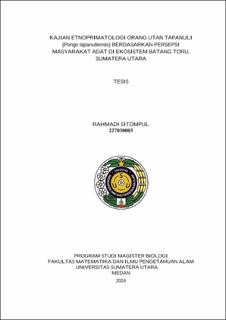Kajian Etnoprimatologi Orang Utan Tapanuli (Pongo tapanuliensis) Berdasarkan Persepsi Masyarakat Adat di Ekosistem Batang Toru, Sumatera Utara
Ethnoprimatology Study of the Tapanuli Orangutan (Pongo tapanuliensis) Based on the Perceptions of Indigenous People in The Batang Toru Ecosystem, North Sumatra

Date
2024Author
Sitompul, Rahmadi
Advisor(s)
Berliani, Kaniwa
Lhota, Stanislav
Metadata
Show full item recordAbstract
The ethnoprimatology study of the Tapanuli orangutan (Pongo tapanuliensis) aims to analyze the cultural aspects related to Tapanuli orangutans based on the perceptions of indigenous people in the Batang Toru ecosystem, namely the Batak Toba, Angkola, and Nias ethnics. This research is crucial to support the conservation of Tapanuli orangutans. The research location comprises villages bordering Tapanuli orangutan habitats, which have also experienced conflicts with orangutans as reported. The data collection method is multispecies ethnography, which includes familiarization, semi-structured interviews, and participant observation. Interview participants were selected using the maximum variation sampling method, while individuals with experience in finding orangutans were chosen for participant observation. Data analysis was conducted using the directed content analysis method. The findings revealed five local names, twelve perceptions, and four categories of folklore about Tapanuli orangutans. The most intriguing local name is "Juhut Bontar." Negative perceptions include considering the orangutan as a dangerous animal, pest, and hunting target. Neutral perceptions include resemblances to humans, possessing supernatural powers, and being descended from humans. Positive perceptions include being attractive, the need for conservation, bringing wages, forest caretakers, helpfulness, and bringing blessings. The majority of folklore found was around the supernatural abilities of orangutans, besides, also about orangutans kidnapping women. Conservation programs for Tapanuli orangutans can consider the findings of this research to design programs that maximize indigenous people's support.
Collections
- Master Theses [266]
